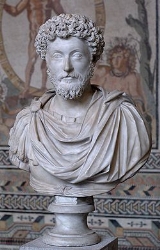
from 161 to 180 AD. He ruled with Lucius Verus
as co-emperor from 161 until Verus' death in 169. He was the last of the "Five Good Emperors", and is also considered one of the most important Stoic
philosophers.
During his reign, the Empire defeated a revitalized Parthian Empire
; Aurelius' general Avidius Cassius
sacked the capital Ctesiphon
in 164. Aurelius fought the Marcomanni
, Quadi
, and Sarmatians
with success during the Marcomannic Wars
, but the threat of the Germanic tribes
began to represent a troubling reality for the Empire.
161 Emperor Antoninus Pius dies and is succeeded by his adoptif sons Marcus Aurelius en Lucius Verus.
173 Marcomannic Wars: The Roman army in Moravia is encircled by the Quadi, who has broken the peace treaty (171). In a violent thunderstorm emperor Marcus Aurelius defeats and subdue them in the so-called "miracle of the rain".
176 Emperor Marcus Aurelius grant his son Commodus the rank of ''Imperator'' and makes him Supreme Commander of the Roman legions.
180 Marcus Aurelius dies leaving Commodus the sole emperor of the Roman Empire.
Say to yourself in the early morning: I shall meet today inquisitive, ungrateful, violent, treacherous, envious, uncharitable men. All these things have come upon them through ignorance of real good and ill. ![]()
You will find rest from vain fancies if you perform every act in life as though it were your last.![]()
The longest-lived and the shortest-lived man, when they come to die, lose one and the same thing.![]()
This thou must always bear in mind, what is the nature of the whole...![]()
Τούτων ἀεὶ μεμνῆσθαι, τίς ἡ τῶν ὅλων φύσις![]()
A man should be upright, not kept upright.![]()
Never esteem anything as of advantage to you that will make you break your word or lose your self-respect.![]()
Remember that man lives only in the present, in this fleeting instant; all the rest of his life is either past and gone, or not yet revealed.![]()
By a tranquil mind I mean nothing else than a mind well ordered.![]()
Men seek retreats for themselves, houses in the country, sea-shores, and mountains; and thou too art wont to desire such things very much. But this is altogether a mark of the most common sort of men, for it is in thy power whenever thou shalt choose to retire into thyself. For nowhere either with more quiet or more freedom from trouble does a man retire than into his own soul![]()

